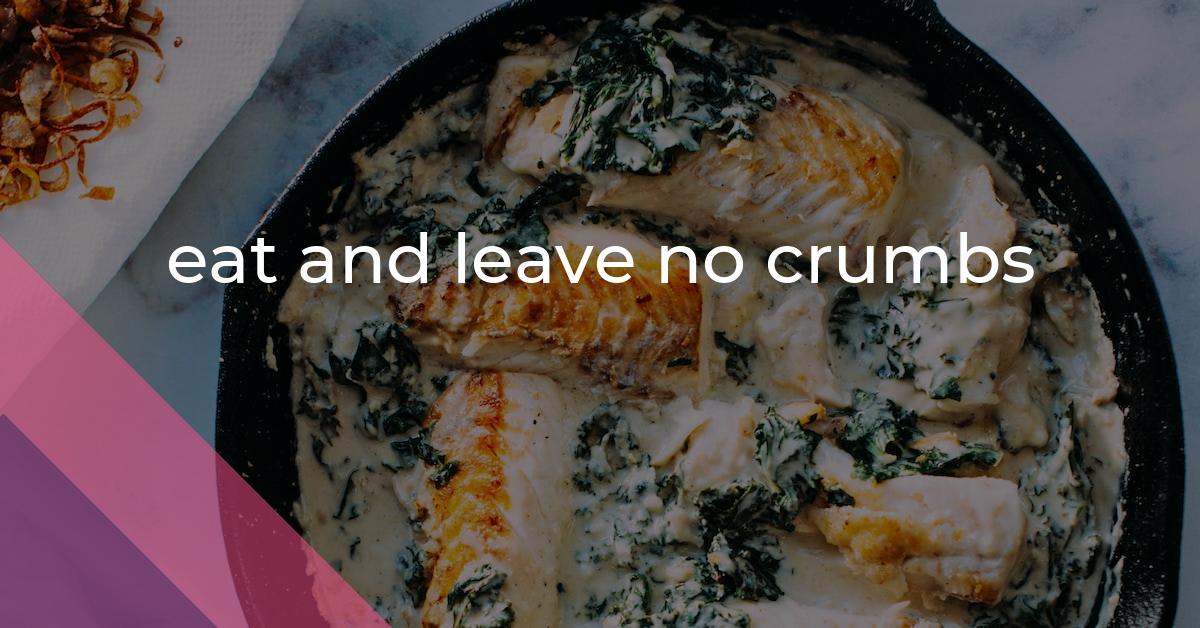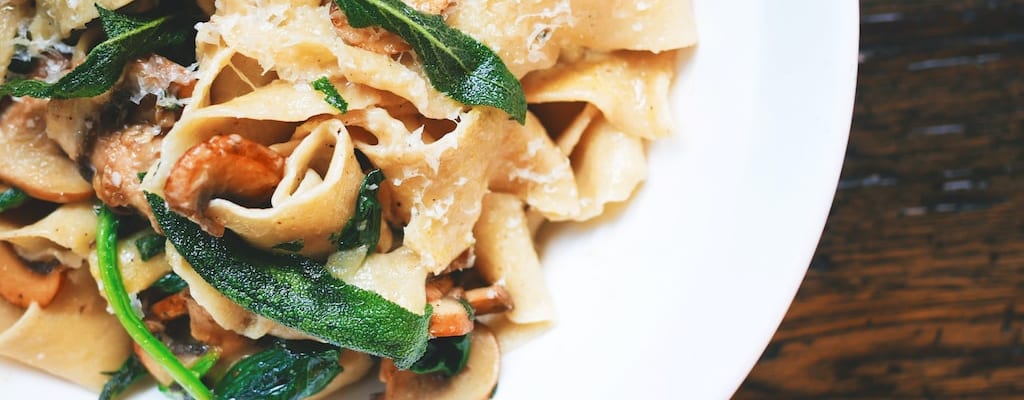eat and leave no crumbs: Idiom Meaning and Origin
What does ‘eat and leave no crumbs’ mean?
The idiom "eat and leave no crumbs" means to consume or use something completely without wasting or leaving any trace or evidence behind.

Idiom Explorer
The idiom "take a bite out of" means to reduce or lessen something, usually by a significant amount.
The idiom "leave no crumbs" means to not leave any evidence or clues behind, ensuring that nothing can be traced back to you.
The idiom "eat one's cake and have it too" means wanting to consume something or achieve a certain outcome, but also wanting to keep it intact or have it for future use. It implies a desire for contradictory things that cannot both be satisfied.
The idiom "eat it" means to accept or tolerate something unpleasant or embarrassing, often with resignation or humility.
The idiom "eat for two" means to eat a large amount of food, often to the point of overeating or indulging excessively. It is a colloquial expression used to describe someone who has a hearty appetite or enjoys eating without restraint.
The idiom "eat dirt" means to suffer a humiliating defeat or to be forced to submit to someone. It is a figurative expression that implies being in a position of inferiority or having to endure a humiliating situation.
The idiom "eat crow" means to admit a mistake or defeat and accept the consequences, often with humility and embarrassment.
The idiom "eat an elephant one bite at a time" means tackling a large or overwhelming task by breaking it down into smaller, more manageable parts.
The idiom "eat, breathe, and sleep" means to be completely consumed or obsessed with something, to the point where it becomes an essential and constant part of one's life.
The idiom "eat one's young" means to destroy or harm the offspring or the next generation, either literally or figuratively, usually due to selfishness or lack of nurturing. It implies a lack of care or regard for the welfare of one's own children or future successors.
Uncovering Hidden Connotations
The idiom "eat and leave no crumbs" is a commonly used phrase, which has its roots in the literal act of eating. The phrase conveys the idea of consuming something completely, without leaving any evidence or trace behind.
First and foremost, the idiom is derived from the literal act of eating and serves as a metaphor for thoroughness. When someone eats a meal and leaves no crumbs, it signifies that they have consumed every last bit, leaving nothing behind. This notion of completeness and attention to detail is carried over into the figurative meaning of the idiom.
Figuratively, "eat and leave no crumbs" is used to describe someone who diligently and thoroughly completes a task, leaving no loose ends or unfinished business. It implies a high level of competence and attention to detail, as well as a sense of professionalism and conscientiousness.
In addition to its metaphorical meaning, the idiom also carries a connotation of being discreet or secretive in one's actions. Just as a person who eats and leaves no crumbs avoids attracting attention or leaving evidence, the idiom suggests that someone is being cautious and mindful of their actions. This can be seen in contexts where the idiom is used to describe someone who conducts themselves in a subtle and calculated manner, avoiding any potential negative consequences.
The idiom "eat and leave no crumbs" is commonly used in various contexts, including business, personal relationships, and even politics. In business, it can describe someone who meticulously handles a project from start to finish, ensuring that all loose ends are tied up and nothing is overlooked. In personal relationships, it can be used to signify someone who is thorough in their actions and considerate of others, leaving no room for misunderstandings or unaddressed issues. In politics, the idiom can be applied to politicians who navigate their way through situations with finesse and strategic precision, avoiding any potential pitfalls that could hinder their progress or reputation.
The related idiom "leave no crumbs" reflects the same idea of thoroughness and attention to detail. Just as someone who eats and leaves no crumbs consumes every last bit of a meal, someone who leaves no crumbs in their actions ensures that there are no loose ends or unfinished business. This idiom can be used in various contexts to emphasize the importance of completeness and conscientiousness, whether it be in a personal or professional setting.
Another related idiom is "bite to eat." Although it may not seem directly related to the idiom "eat and leave no crumbs," it still conveys the concept of consuming something. "Bite to eat" is often used to describe a small snack or meal, usually when someone is feeling hungry but not necessarily in need of a full meal. Just as someone who "eats and leaves no crumbs" consumes every last bit, someone who takes a "bite to eat" consumes a small portion of food. While the two idioms may differ in scale, they both symbolize the act of consuming something.
Similarly, the idiom "cake crumbs" is related to the concept of consuming food. In this case, it specifically refers to the remnants or leftover crumbs from a cake. Just as someone who "eats and leaves no crumbs" consumes every last bit of their meal, the phrase "cake crumbs" signifies the small pieces or remnants of a cake that are left behind after it has been eaten. This idiom can be used in various contexts to symbolize the idea of not wasting or leaving anything behind.
Another idiom related to consuming food is "take a bite out of." While it may not directly incorporate the idea of leaving no crumbs, it still emphasizes the act of consuming something. "Take a bite out of" is often used to describe taking a small portion or sample of something, typically with the intention of tasting or trying it. Just as someone who "eats and leaves no crumbs" consumes every last bit, someone who "takes a bite out of" something consumes a small portion of it. Both idioms underscore the act of consuming, albeit on different scales.
Finally, the idiom "eat, breathe, and sleep" is closely related to the idea of consuming. This idiom is used to describe someone who is completely immersed or obsessed with a particular activity or subject. It suggests that the person's thoughts and actions revolve solely around that specific thing. While it may not incorporate the notion of avoiding leaving crumbs or unfinished business, it still reflects the idea of consuming something wholeheartedly. Just as someone who "eats and leaves no crumbs" consumes every last bit, someone who "eats, breathes, and sleeps" a particular activity or subject devotes themselves entirely to it.
The idiom "eat and leave no crumbs" derives from the literal act of eating and conveys the importance of thoroughness, competence, and discretion. It is commonly used to describe individuals who demonstrate a high level of attention to detail and conscientiousness in their actions, while also being mindful of potential repercussions. By adopting this metaphor, the idiom encapsulates the idea of consummate professionalism and meticulousness in various aspects of life. As with any idiom, its interpretation and usage may evolve over time, but its essence remains rooted in the notion of being thorough and leaving nothing undone.
Example usage
Example 1: He always ensures that he eats and leaves no crumbs when he goes to his friend's house.
Example 2: The company's CEO was accused of eating and leaving no crumbs, as he stole a huge sum of money and vanished without a trace.
Example 3: After finishing their meal, the family meticulously cleaned the kitchen, aiming to eat and leave no crumbs behind.
More "Etiquette" idioms



